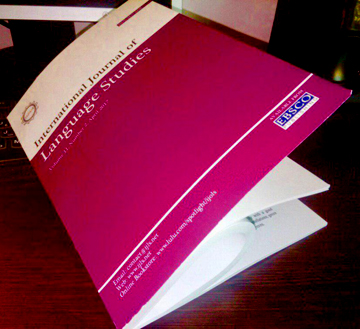International Journal of Language Studies
A Quarterly Journal of Applied Linguistics
ISSN: 2157-4898 | eISSN: 2157-4901
Sherpa/RoMEO Color: Yellow
Editor: Mohammad A. Salmani Nodoushan
October 2009 - Volume 3 issue 4 - Pages 409 - 452
BACK TO TOP
Urdu-English code switching: The use of Urdu phrases and clauses in Pakistani English (A non-native variety)
, University of Islam Abad, Pakistan | Contact Author
Iranian Journal of Language Studies, 3(4), 409-424. | Download PDF | Add Print to Cart
This paper presents an analysis of Urdu-English code-switching in Pakistani English. However, data has been analysed only at the phrase and clause level. Based on the empirical data from Pakistani newspapers and magazines, this paper aims to show that code-switching is not a grammarless phenomenon rather it is ruled governed activity at the phrase and clause level. It also presents the brief overview of the use of English as non-native variety. This paper suggests that variations and changes in a language are an integral part of bilingualism and multilingualism. All the present data shows that the occurrence of Urdu phrases and clauses imposes no ungrammatical effect on the construction of English syntax.
Citation: Anwar, B. (2009). Urdu-English code switching: The use of Urdu phrases and clauses in Pakistani English (A non-native variety). Iranian Journal of Language Studies, 3(4), 409-424.
BACK TO TOP
Techniques for classroom interaction
, Research Institute for Education, Iran | Contact Author
Iranian Journal of Language Studies, 3(4), 425-435. | Download PDF | Add Print to Cart
According to Interaction-Based Instruction, samples of the target language become available to the learner for interlanguage construction through classroom interaction. Through carefully designed classroom interaction activities, involving various forms of more or less realistic practice, learners can become skilled at actually doing the things they have been taught about. The problem is that the learners don’t know instinctively how to interact with each other. This research presents a number of teaching techniques that addresses the problems that EFL teachers face to provide an interactive classroom condition. These techniques are the strategies of classroom interaction, such as questioning techniques and modification through cooperative method of learning. The sample comprised 48 intermediate EFL learners who had registered at a private language institution. A pre-test, post–test, and control and experimental groups were designed. The results of post-test indicated statistically significant difference between the control and experimental groups on their conversation performance. The most obvious implication for the use of interaction-based instruction would be for language teachers, language learners and language syllabus designers. As a case in point, teachers can use the strategies of classroom interaction to improve the learners’ conversation performance and develop their interest in English language learning.
Citation: Kalantari, R. (2009). Techniques for classroom interaction. Iranian Journal of Language Studies, 3(4), 425-435.
BACK TO TOP
Investigating Persian EFL teachers and learners' attitudes towards humor in class
, University of Isfahan, Iran | Contact Author
, University of Isfahan, Iran | Contact Author
Iranian Journal of Language Studies, 3(4), 436-452. | Download PDF | Add Print to Cart
Humor is an important personal and interpersonal interaction which could be used as an effective tool in education in general and language learning in particular. Humor is one of the effective means of enhancing students' motivation to study English. It can promote students` interaction, ease the constant tension in the class and encourage students to take part in various activities. In fact, humor serves as an affective means of reducing affective barriers to language learning; and it can be used effectively in a number of ways and for different reasons in foreign language learning. In order to investigate the benefits of using humor in the language classroom, diverse groups of Persian EFL teachers and learners were asked to evaluate the use of humor in their classrooms. Results of this study strongly confirm a perceived effectiveness for humor as a very useful strategy to learning and teaching of foreign languages.
Citation: Simin, S., & Ketabi, S. (2009). Investigating Persian EFL teachers and learners' attitudes towards humor in class. Iranian Journal of Language Studies, 3(4), 436-452.
BACK TO TOP
Copyright © International Journal of Language Studies 2007 - All Rights Reserved
Template by OS Templates

